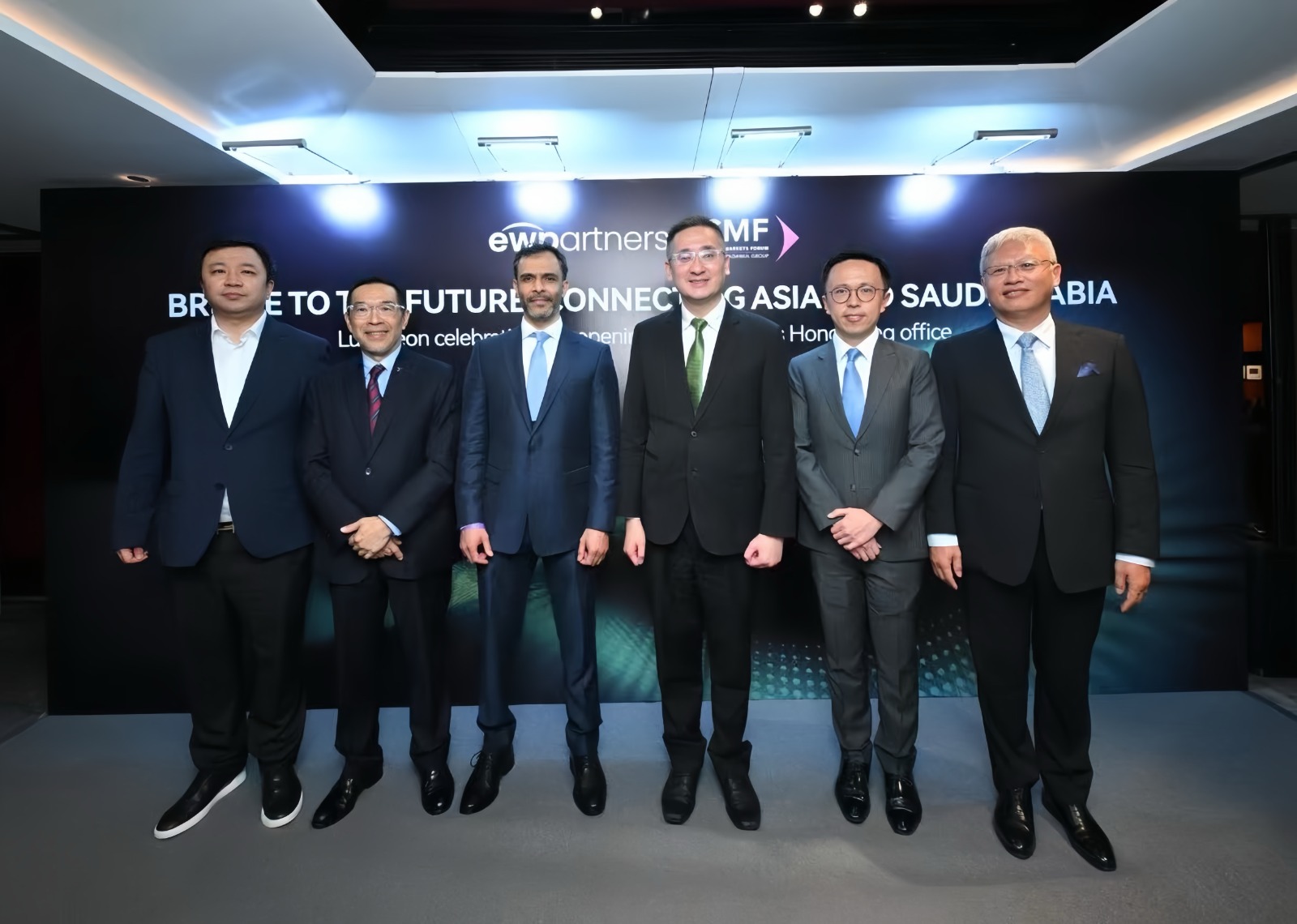
An international investment firm specializing in cross-border investments between East Asia and the Middle East is bullish about the vast regions’ new growth opportunities with the launch of its Hong Kong office, defying geopolitical challenges and policy disruptions.
In his opening remarks at a Hong Kong luncheon on Thursday, Cliff Chau, managing partner at EWPartners, outlined two ongoing “important trends” that were driving global realignments — the rise of nonoil economies in Middle East countries, and shifts in the geopolitical landscape.
“Trade barriers are building. We are seeing more regionalization of global supply chains, so more Chinese companies are also interested in looking for other opportunities and solutions to their supply chain management, to their manufacturing capability, to their products and services,” Chau said.
Since its establishment in Saudi Arabia in 2017, EWPartners — formerly known as eWTP Arabia Capital — has bridged capital and expertise between East Asia and the Middle East with over 20 projects. Over the past several years, the companies it has worked with “have brought down the technological barriers, including productivities, created jobs and generated values to our investors”, Chau said.
Chau said the Middle East “is an ideal destination for Chinese companies to consider, both from population to economy, the vibrancy of the economy, and even from the tariff perspective”. Furthermore, there has been a surge of “reverse inquiries” from Chinese companies seeking guidance on entering new regions. Reverse inquiries are those that a potential investor would make about a one-time purchase of a debt security.
“So we believe that these two trends are working very well together to become part of the main reason that we are very bullish about this region,” Chau said.
“Hong Kong has been positioning itself as a superconnector and super value-adder between regions. Our investment visas resonate perfectly with such positioning and that’s why we opened our Hong Kong office. I believe that capital is speaking for itself.”
The luncheon, co-hosted by the Capital Markets Forum Hong Kong, the Saudi Tadawul Group, and Hong Kong Exchanges and Clearing Ltd, brought together around 100 key representatives from Hong Kong’s and Saudi Arabia’s respective core government agencies, investment institutions, and entrepreneurs.
In response to Hong Kong Chief Executive John Lee Ka-chiu’s message of best wishes, in which he called for “fostering strategic partnerships across borders, driving innovation, growth and prosperity”, Chau said his firm was “delighted to accept” the call.
Mohammed bin Sulaiman Al-Rumaih, CEO of Saudi Exchange, highlighted the robust growth of the Saudi capital markets, with record IPOs and increased investor participation, solidifying its position as one of the top exchanges regionally and among the top 10 globally.
He said the collaboration between Saudi Arabia and Hong Kong plays a critical role. For instance, Sahm Capital, a subsidiary of Valuable Capital Group and supported by EWPartners, has become one of the fastest-growing fintech companies in Saudi Arabia.
“Looking ahead, we are excited about further cross-regional partnerships and fulfilling our commitments to drive growth and innovation in the Middle East and beyond,” Al-Rumaih said.
Capital interaction between Saudi Arabia and Hong Kong is at an all-time high. The Premia BOCHK Saudi Arabia Government Sukuk ETF, listed during the event, is now trading on the Hong Kong Stock Exchange. Landmark deals also include CATL’s $5.3 billion IPO and BYD’s HK$43.5 billion ($5.5 billion) H-share placement featuring strong Middle Eastern investor participation.
Bernard Chan Pak-li, Hong Kong’s undersecretary for commerce and economic Development, said EWPartners is making the “right choice” in establishing its presence in the city.
“As we may all agree, Hong Kong is the only place in the world where global advantage and China advantage converge in a single economy,” said Chan, adding that the city’s competitive advantages included the rule of law, the free flow of capital, the free investment and trade regime, and a clean and efficient government.
While he acknowledged that the world was facing a new wave of global challenges, underscored by geopolitical tensions and geoeconomic fragmentation, he also said, “We are seeing some very promising developments.
“The dynamics of the global economy are shifting with the Global South, asserting more and more influence in particular. The Middle East is really promising in terms of the growth and sourcing international partnerships,” said Chan, as he assured Saudi Arabian enterprises at the luncheon that those at his firm “stand ready to help, free of charge”.
At the same event, EWPartners and Tahaluf — the companies behind the Leap tech conference — formally announced an exclusive strategic partnership for Leap East 2026, the Asia-Pacific edition of Saudi Arabia’s flagship technology event, scheduled for July 8-10 next year in Hong Kong.
EWPartners has facilitated partnerships with leading Hong Kong-related tech firms — including Alibaba Cloud under Alibaba Group, J&T Express, and Leshines, the supply-chain solutions arm of Lenovo —helping businesses leverage Hong Kong's strategic position and technology to expand into the Middle East. These insights were summarized in EWPartners’ white paper, "Asia to Arabia: Strategic Investment Pathways in the GCC", released during the luncheon.


